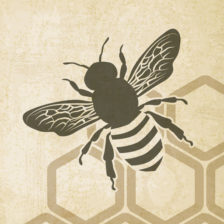Aix-en-Provence, France
I have just returned from a visit to APISERVICES, a consulting group headed by a Mr. Gilles Ratia who lives in the Department called Dordogne in the southwest of France, near the capital town of Périgueaux. Mr. Ratia, a former professional beekeeper in France, now devotes himself to the information revolution. His internet site in four languages is e one of the most comprehensive on the web. The breadth of APISERVICES activities is enormous. The goals are to promote commercial honey production and pollination, integrate beekeeping into rural development projects and introduce computers as a management tool in beekeeping operations. Mr. Ratia is fomerly President of Apimondia.
As part of my visit, I was able to visit Ets Thomas Fils, one of Europe’s largest beekeeping manufacturers with third generation management. In their showroom I was treated to a demonstration of full automatic uncapping and extracting of both Hoffman and the narrow end bars most beekeepers use here in France. The catalog includes a huge number of items, some not found in those of other manufacturers (see the web site created by APISERVICES above). An innovative observation hive; a ten-frame colony with transparent sides and placed in a circular plastic bubble adorns the showroom, as does a device sold to supermarkets to automatically dispense honey to a customer. Thomas uses 150 tons of stainless steel a year in the manufacturing process; a room full of used equipment revealed the quality of the machinery. Much of the material still looked brand new to me. A slick brochure shows stills of a film of Thomas’ equipment extracting five tons of honey in 50 square meters as some 400 persons looked on. The equipment, according to the brochure, is designed to allow two persons to extract up to 8 tons per day. Thomas is not well known in the U.S., but beekeepers will be able to see this equipment first hand at the 1999 Apimondia Congress in Vancouver, B.C.

